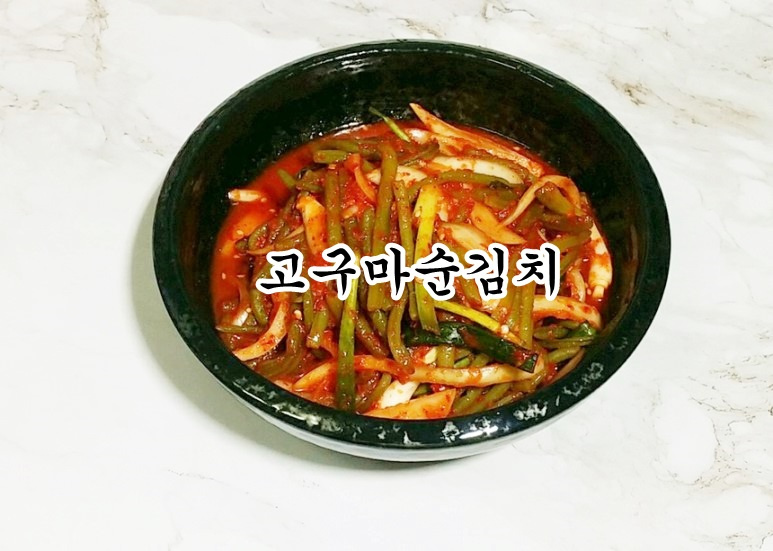Crispy and Sweet Sweet Potato Stem Kimchi (Fresh Kimchi Style)
Sweet Potato Stem Kimchi, Summer Kimchi, Easy Kimchi Recipe, Fresh Kimchi, Rice Thief

Tired of the same old kimchi? Try this refreshing and crunchy sweet potato stem kimchi, a perfect summer delicacy! Instead of bland summer cabbage kimchi or repetitive radish kimchi, this recipe offers a fresh, slightly sweet flavor akin to ‘geotjeori’ (fresh kimchi), sure to impress even those who don’t typically enjoy kimchi. Add a vibrant touch to your table with its refreshing taste that stimulates the appetite.
Main Ingredients- Prepared Sweet Potato Stems: 300g (approx. 3 handfuls)
- Scallions: 100g (approx. 1 handful)
- Onion: 1/2 medium
Seasoning Ingredients- Fish Sauce (or Soy Sauce): 3 Tbsp (anchovy or sand lance fish sauce recommended)
- Water: 30ml (approx. 2 Tbsp)
- Red Chilies: 6 medium (seeds removed)
- Apple: 1/4 (cored and roughly chopped)
- Cooked Rice or Rice Paste: 1 Tbsp
- Fine Gochugaru (Korean chili flakes): 3 Tbsp
- Minced Garlic: 1 Tbsp
- Maesil Cheong (Plum Extract): 1 Tbsp (adjust sweetness to taste)
- Corn Syrup or Oligosaccharide Syrup: 1 Tbsp (adds gloss and sweetness)
- Toasted Sesame Seeds: 1 Tbsp
- Fish Sauce (or Soy Sauce): 3 Tbsp (anchovy or sand lance fish sauce recommended)
- Water: 30ml (approx. 2 Tbsp)
- Red Chilies: 6 medium (seeds removed)
- Apple: 1/4 (cored and roughly chopped)
- Cooked Rice or Rice Paste: 1 Tbsp
- Fine Gochugaru (Korean chili flakes): 3 Tbsp
- Minced Garlic: 1 Tbsp
- Maesil Cheong (Plum Extract): 1 Tbsp (adjust sweetness to taste)
- Corn Syrup or Oligosaccharide Syrup: 1 Tbsp (adds gloss and sweetness)
- Toasted Sesame Seeds: 1 Tbsp
Cooking Instructions
Step 1
First, peel the outer skin of the sweet potato stems and remove any tough parts. Wash them thoroughly under running water. Trim the roots and remove any wilted leaves from the scallions, then wash them clean.

Step 2
In a large pot, bring plenty of water to a rolling boil and add 1 teaspoon of salt. Once the water is boiling, add the prepared sweet potato stems and blanch them for just about 3 minutes. The key is to blanch them very briefly, just enough to soften them slightly, not to cook them through, as they can become mushy if overcooked.

Step 3
Immediately rinse the blanched sweet potato stems under cold running water to cool them down. Drain them thoroughly in a colander until all excess water is removed. Then, cut them into bite-sized pieces, about 5-7 cm long. Cut the scallions to a similar length as the sweet potato stems, and thinly slice the onion.

Step 4
In a blender, combine the deseeded red chilies, chopped apple (peeled), 3 Tbsp fish sauce, 30ml water, and 1 Tbsp cooked rice. Blend until smooth. If you don’t have a blender, you can use a grater. Using rice paste (chapssalpul) will help the seasoning adhere better and create a smoother taste.

Step 5
In a bowl, mix the blended seasoning with 3 Tbsp fine gochugaru, 1 Tbsp minced garlic, 1 Tbsp maesil cheong, and 1 Tbsp corn syrup. Stir well until all ingredients are combined. The blended red chilies give a beautiful color, and the hint of sweetness and fruitiness from the apple adds a wonderful umami flavor.

Step 6
Your seasoning paste is ready! The blended red chilies give it a vibrant color, and just 3 tablespoons of gochugaru create a perfectly spicy and deep flavor. The aromatic scent from the seasoning is already making your mouth water!

Step 7
In a large bowl, add the prepared sweet potato stems, scallions, and sliced onion. Pour all the prepared seasoning over them. Gently mix with your hands, ensuring the seasoning coats every strand of sweet potato stem evenly. Be careful not to overmix, as this can break the stems.

Step 8
Finally, sprinkle 1 Tbsp of toasted sesame seeds evenly over the kimchi to add a nutty flavor. If you lightly rub the sesame seeds before sprinkling, their aroma will be even richer.

Step 9
If the taste is not quite right, you can adjust the seasoning with a little more salt or fish sauce to your preference. However, adding too much fish sauce can overpower the natural subtle sweetness and aroma of the sweet potato stems, so it’s best to taste and add cautiously.

Step 10
The finished sweet potato stem kimchi can be eaten immediately, but it develops a deeper flavor if allowed to ferment at room temperature for about 5-6 hours before refrigerating. After refrigerating in the kimchi fridge, it was perfectly seasoned and delicious the next day.

Step 11
Visually, it might resemble radish kimchi, but the taste is entirely different! The combination of the crunchy texture, mild sweetness, and fresh seasoning offers a unique charm. Be sure to try it and awaken your summer appetite!



